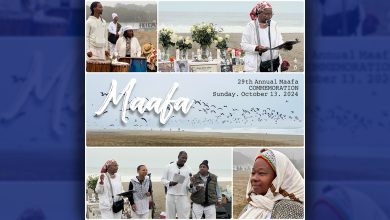MacArthur Fellow Jericho Brown’s Poetry Reflects Contemporary Culture and Identity

Special to The Post
When grants were announced earlier this month, it was noted that seven of the 22 MacArthur ‘Genius’ Award fellows were African American. Among them are scholars, visual and media artists a poet/writer, historian, and dancer/choreographer. The awardees receive $800,000 over a five-year period. Poet Jericho Brown is featured in the second installment published by The Post.
Jericho Brown was born in 1976 in Shreveport, Louisiana, in 1976, and attended Dillard University, joining the AKAs in 1995 before graduating. He received an MFA in Creative Writing from the University on New Orleans and later a PhD from the University of Houston.
He has held a variety of academic positions, teaching English and/or Creative Writing at San Diego State University, the University of San Diego, and at workshops and conferences, including the University of Iowa.
He currently works as the director of the Creative Writing Program at Emory University in Atlanta, Georgia.
“Please,” his first volume of poetry and prose published in 2008, won the American Book Award. His third book, “The Tradition,” won the Pulitzer Prize for Poetry in 2020. Below is a description of his work from The MacArthur Foundation website.
“Jericho Brown is a poet reflecting on contemporary culture and identity in works that combine formal experimentation and intense self-examination. He reimagines well-known poetic forms and rhythmic structures in ways that heighten a poem’s emotional charge. Across three collections, Brown explores themes of masculinity, spirituality, family, sexuality, and racial identity from a personal perspective as well as from feelings inspired by pop culture and contemporary America.
In his first collection, “Please” (2008), Brown incorporates influences from popular music, such as replicating syncopation of classic rhythm and blues, as he describes the sometimes blurred boundary between intimacy and violence. Brown’s second book, “The New Testament” (2014), draws connections between individual suffering and broader injustices such as the HIV/AIDS crisis, mass incarceration, and community trauma.
In several poems, Brown reworks biblical passages to emphasize the isolation and oppression that many experience in America. Brown’s calibration of form, tone, and language is even more fully realized in “The Tradition” (2019).
He introduces a form of his own invention—the duplex (or gutted sonnet)—that is a fusion of the traditional sonnet, the Arabic ghazal, and the ironic holler of American blues. It is comprised of 14 lines of seven couplets, with the first line of each couplet echoing the second line of the previous one, and the last line echoing the poem’s first.
The circular repetition lends itself to shifts between dissonant voices or images; for example, in one duplex the speaker’s train of thought moves from a first love, to his abusive father, to his grieving mother. In other variations on the sonnet form, shifting perspectives bring the reader face-to-face with violence inflicted on Black lives.
The title poem in The Tradition begins like a pastoral lyric, with a list of flower names: “Aster. Nasturtium. Delphinium.” Brown deftly touches on the evolution of Black life in America in relation to the land—sharecropping and climate change—before pulling the reader firmly into the present moment with a lament for lives cut short at the hands of police: “John Crawford. Eric Garner. Mike Brown.”
Brown writes with frankness and vulnerability about love, both filial and erotic. He explores the complexities of his identity as a Black gay man and expresses tenderness and devotion toward his mother and other Black women. In poems with astonishing lyrical beauty, Brown illuminates the experiences of marginalized people and shows the relevance and value of formal experimentation.





